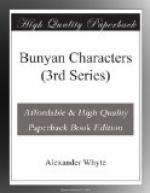Forasmuch, so ran the Prince’s presentation paper, as he is a native of the town of Mansoul, and thus has personal knowledge of all the laws and customs of the corporation, therefore he, the Prince, presented Mr. Conscience. That is to say, every man who is to be the minister of a parish should make his own heart and his own life his first parish. His own vineyard should be his first knowledge and his first care. And then out of that and after that he will be able to speak to his people, and to correct, and counsel, and take care of them. In Thomas Boston’s Memoirs we continually come on entries like this: ’Preached on Ps. xlii. 5, and mostly on my own account.’ And, again, we read in the same invaluable book for parish ministers, that its author did not wonder to hear that good had been done by last Sabbath’s sermon, because he had preached it to himself and had got good to himself out of it before he took it to the pulpit. Boston kept his eye on himself in a way that the minister of Mansoul himself could not have excelled. Till, not in his pulpit work only, but in such conventional, commonplace, and monotonous exercises as his family worship, he so read the Scriptures and so sang the psalms that his family worship was continually yielding him fruit as well as his public ministry. As our family worship and our public ministry will do, too, when we have the eye and the heart and the conscience that Thomas Boston had. ‘I went to hear a preacher,’ said Pascal, ‘and I found a man in the pulpit.’ Well, the parish minister of Mansoul was a man, and so was the parish minister of Ettrick. And that was the reason that the people of Simprin and Ettrick so often thought that Boston had them in his eye. Good pastor as he was, he could not have everybody in his eye. But he had himself in his eye, and that let him into the hearts and the homes of all his people. He was a true man, and thus a true minister.
2. Both Boston and the minister of Mansoul were well-read men also; so, indeed, in as many words, their fine biographies assure us. But that is just another way of saying what has been said about those two ministers over and over again already. William Law never was a parish minister. The English Crown of that day would not trust him with a parish. But what was the everlasting loss of some parish in England has become the everlasting gain of the whole Church of Christ. Law’s enforced seclusion from outward ministerial activity only set him the more free to that inward activity




